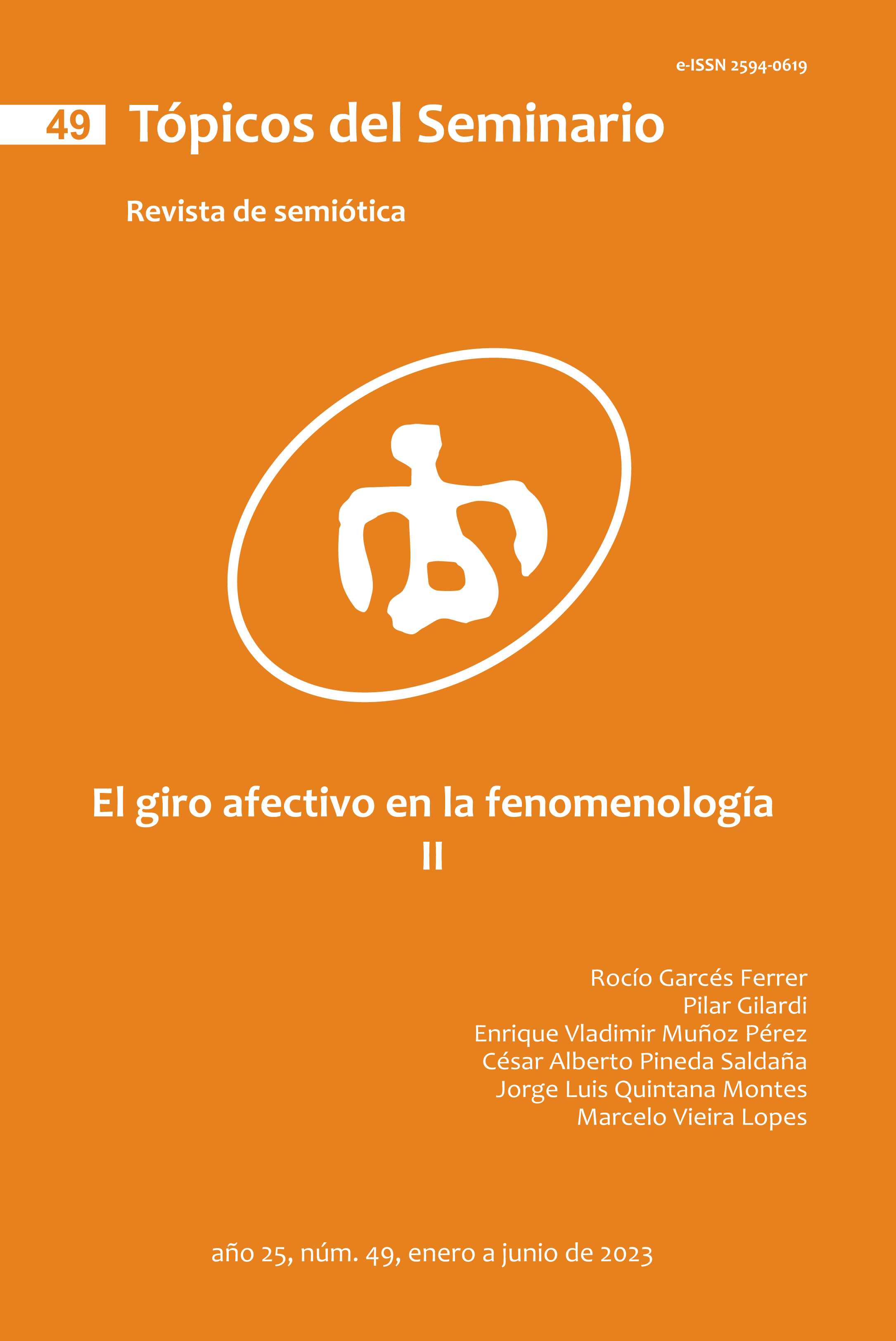On the Distinction between Stimmung and Existential Feelings: The Relevance of Psychiatric Cases
DOI:
https://doi.org/10.35494/topsem.2023.1.49.848Keywords:
Existencial feelings, Heidegger, PsychiatryAbstract
Recent debates in philosophy, psychology and cognitive sciences have emphasized the role of emotions as constituents of the basic substrate of our affective life. Contemporary phenomenological research, in particular, has addressed the experiential dimension of emotions and their relation to ontological and taxonomic issues. This paper seeks to contribute to that debate by presenting a distinction between Heidegger’s notion of Stimmung and Ratcliffe’s notion of existential feelings. Like Heidegger’s Stimmungen, existential feelings determine how one finds oneself in the world. In some cases, however, the world can seem unreal, distant, permeated by deep despair. My main goal is therefore to clarify the relationship between these descriptive categories by appealing to the description of psychiatric disorders. I present taxonomic, conceptual and methodological reasons for distinguishing Stimmung from existential feelings.
Downloads
References
Aho, K. (2009) Heidegger’s Neglect of the Body. Albany. State University of New York Press.
Aho, K. (2019) Contexts of Suffering: A Heideggerian Approach to Psychopathology. London, New York. Rowman and Littlefield International.
Bollnow, O. F. (2017). The Nature of Stimmungen. Philosophia, 45, 1399-1418. DOI: 10.1007/s11406-017-9923-z Carel, H. (2016). The Phenomenology of Illness. Oxford. Oxford University Press.
Cerbone, C. (2000) Heidegger and Dasein’s ‘Bodily Nature’: What is the Hidden Problematic? International Journal of Philosophical Studies, 8, 209-230, DOI: 10.1080/09672550050084018
Drummond, J. (2018). Emotions, value, and action. En Parker, Rodney K.B./Quepons, Ignacio. (Eds.) The New Yearbook for Phenomenology and Phenomenological Philosophy. London. Routledge.
Ferran, Í. (2015). The Emotions in early phenomenology. Studia Phaenomenologica, 15, 349-374.
Freeman, L. (2014). Toward a phenomenology of mood. Southern Journal of Philosophy, 52 (4), 445-476.
Elpidorou, A. & Freeman, L. (2015a). Affectivity in Heidegger I: Moods and Emotions in Being and Time. Philosophy Compass, 10(10), 661-671.
Elpidorou, A. & Freeman, L. (2015b). Affectivity in Heidegger II: Temporality, Boredom, and beyond. Philosophy Compass, 10(10), 672-684.
Fuchs, T. (2013a). The Phenomenology of Affectivity. In: K.W.M. Fulford, Martin Davies, Richard G. T. Gipps, George Graham, John Z. Sadler, Giovanni Stanghellini, Tim Thornton (Eds.). The Oxford Handbook of Philosophy and Psychiatry. Oxford University Press.
Fuchs, T. (2013b). Existential Vulnerability: Toward a Psychopathology of Limit Situation. Psychopathology, DOI: 10.1159/000351838. Goldie, P. (2000). The Emotions: A Philosophical Exploration. New York. Clarendon Press.
Golob, S. (2017). Methodological Anxiety: Heidegger on Moods and Emotions. En Stern, R. & Cohen, A. (Eds.) Thinking about the Emotions: A Philosophical History. Oxford. Oxford University Press. Hadjioannou, C. (2019). Heidegger on Affect. Palgrave Macmillan.
Heidegger, M. (1957). Sein und Zeit. Tübingen. Niemeyer.
Heidegger, M. (1983). Die Grundbegriffe der Metaphysik (GA29/30). Frankfurt am Main. Editorial Vittorio Klostermann.
James, W. (2002). Varieties of Religious Experience: A Study in Human Nature. London and New York. Routledge. [Original publicado en 1902].
Krebs, A. (2017). Stimmung: From Mood to Atmosphere. Philosophia, 45(4), 1419-1436.
Kreuch, G. (2019). Self-feeling: Can self-consciousnnes be understood as feeling? Cham. Springer.
Leder, D. (1990). The Absent Body. Chicago. University of Chicago Press.
Mulhall, S. (1996). Heidegger and Being and Time. Routledge Philosophy GuideBooks. New York: Routledge.
Ratcliffe, M. (2002) Heidegger’s attunement and the neuropsychology of emotion. Phenomenology and the Cognitive Sciences, 1(3), 287-312.
Ratcliffe, M. (2005). The feeling of being. Journal of Consciousness Studies, 12 (8-10), 43-60.
Ratcliffe, M. (2008). Feelings of Being. Phenomenology, Psychiatry and the Sense of Reality. New York. Oxford University Press.
Ratcliffe, M. (2015) Experiences of Depression: A Study in Phenomenology. New York. Oxford University Press.
Ruin, H. (2000). The Passivity of Reason-On Heidegger’s Concept of Stimmung, SATS 1(2), 143-159. Saarinen, J. (2018). A critical examination of existential feeling. Phenomenology and the Cognitive Sciences, 17, 363-374.
Slaby, J & Stephan, A. (2008). Affective intentionality and self-consciousness. Consciousness and Cognition, 17(2), 506-513.
Svenaeus, F. (2018). Why Heideggerian Death Anxiety is not Truly Uncanny: Existential Feelings and Psychiatric Disorders. Discipline filosofiche. XXVIII.
Szanto, T & Landweer, H. (2020). The phenomenology of emotions-above and beyond “What it is Like to Feel”. En Szanto, T.; Landweer, H. (Eds.). The Routledge Handbook of Phenomenology of Emotion. Routledge.
Trigg, D. (2020). The role of atmosphere in shared emotion. Emotion, Space and Society, 35.
Weberman, D. (1996). Heidegger and the disclosive character of the emotions. Southern Journal of Philosophy, 34(3), 379-410.
Withy, K. (2015). Heidegger on Being Uncanny. Cambridge, MA. Harvard University Press.
Downloads
Published
How to Cite
Issue
Section
License

Tópicos del Seminario is licensed under a Creative Commons Reconocimiento-NoComercial-CompartirIgual 4.0 Internacional License.














